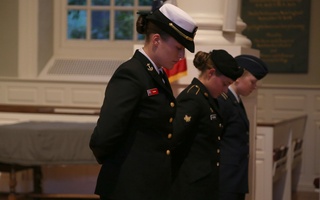Many Harvard students seem to skip mornings entirely. For the few individuals up at the ungodly hour of 0800, breakfast provides a short respite from Harvard’s hectic atmosphere. At 0800, most people enjoying breakfast remain reserved, quietly assessing their plans for the day. However, I’m unusual in that I’m at my happiest during breakfast. Breakfast provides my daily serving of Cracklin’ Oat Bran, a delicious cereal responsible for healing my otherwise broken, weary soul. More importantly, breakfast grants me a much-needed rest between two different worlds: ROTC and Harvard.
When morning training comes to a close, I briefly feel free from ROTC. Sadly, three characteristics of ROTC keep me trapped in Cadet Land. The first involves the Army’s physical training uniform.
The bold “ARMY” insignia sprawled across the Army shirt and absurdly short shorts attract nothing but unwanted attention. It’s hard to escape Cadet Land when your clothes serve as a constant reminder that you’re Uncle Sam’s property. To make matters worse, last semester I was tasked with carrying our training group’s guidon, a glorified spear with a flag attached. When I’m carrying the guidon, people look at me like I’m a knight from Game of Thrones carrying his king’s war banner. Fortunately, most cut their gaze short, politely turning to avoid prolonged eye contact. I like those people; in turning away, they allow me to pretend I’m normal.
The next characteristic of ROTC constantly haunts cadets, even when we’re out of uniform. On top of endless emails from Harvard, cadets must also deal with ROTC emails. One can pretend not to have read student email with little consequence, but military emails demand an immediate response. Emails from cadre (the officers and NCO’s who oversee our training) often include the phrase “please acknowledge receipt of email.”
If you’re particularly unlucky, you’ll find an ROTC email asking for volunteers for some “optional” event. Harvard’s Army ROTC program consists of solely 6 cadets, which means every cadet needs to “volunteer” when an event comes along. That weekend you thought you were free to catch up on work? Joke’s on you; the Army just commandeered your Saturday morning. Should a cadet decide to ignore their email, they’ll soon receive a call from one of their higher-ups inquiring as to why they haven’t responded yet. Ignore the call, and you’ve just dug your own grave.
The last ROTC characteristic responsible for trapping cadets emerges from the term “cadet” itself. Due to our strange position between the Army and Harvard, we frequently find that no one understands our role.
On one hand, those in uniform often think of us as pampered students. Aside from the occasional weekend in the woods, we only train every other day. Meanwhile, active duty personnel find themselves immersed in a military environment 24/7. Our student counterparts, on the other hand, think we’re full-time soldiers. Our peers speak as if we’re to blame for the military’s past and current failures, forgetting that we’re at the bottom of the Army’s totem pole. If anything, we share your critiques of US military policy! After all, many of us joined ROTC to change military doctrine; we’re just in no position to enact change yet.
We’re constantly reminded that we’re outsiders to all. Our uniforms separate us, our email overwhelms us, and our lifestyle leaves us with few to turn to.
Like most old institutions, both the Army and Harvard have unique cultures. Both take pride in their independence, each operating in the manner they see fit. But more importantly, the two organizations draw their members from two different groups of people with distinct mindsets. Historically, Harvard was founded to serve America’s wealthy intellectual elite, whereas the Army prides itself on drawing heavily from America’s blue-collar families to answer their country’s call to service. Thus, neither institution fully comprehends the other, leaving cadets to navigate the unknown waters between the Army and Harvard alone.
Nathan Williams ’18, a current ROTC cadet, is a government concentrator living in Mather House.
Read more in Opinion
Unlocking the Bridging and Belonging GrantRecommended Articles
-
So Much for CoverWhen walking into class in uniform, I feel like I’m on trial. The atmosphere becomes tense; people look at me as if I’m spearheading some sort of military takeover of Harvard.
-
Books & BulletsThe expectations cadets encounter are what make the transition between school and ROTC both humorous and difficult.
-
 Harvard to Officially Recognize Air Force ROTC
Harvard to Officially Recognize Air Force ROTC -
Generic InspirationI want unfiltered answers, not a pat on the back or another consolatory sandwich from some OCS event.
-
This We’ll DefendROTC more closely resembles an extracurricular activity than anything else, but it’s an extracurricular activity in which I’ve raised my right hand and taken an oath to defend my country. Becoming a Harvard officer is, at least to me, the ultimate honor, and there is not a flicker of doubt in my mind that I’ve chosen the right path. But I also know there is an opportunity cost to everything.













